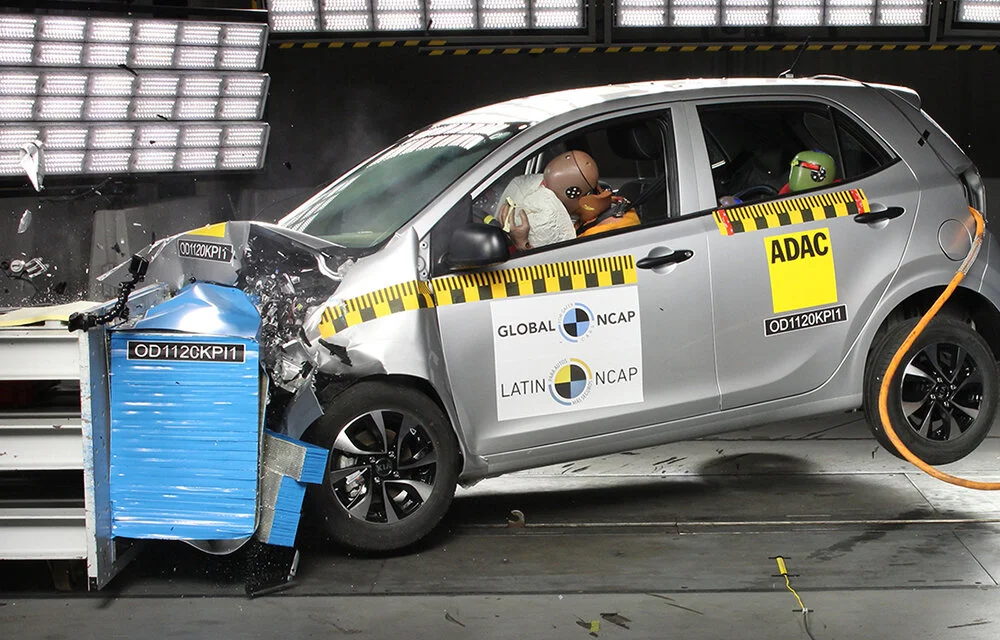Latin NCAP Latest Result: New Kia Picanto (Morning) Zeroes Again
The New Car Assessment Programme for Latin America and the Caribbean, Latin NCAP, first result of 2020 under the new assessment protocol was released today with a disappointing zero stars for the New Kia Picanto (Morning).
The Kia Picanto, produced in South Korea and equipped only with driver frontal airbag as standard was rated with zero stars, achieving 0% in the Adult Occupant box, 29% in the Child Occupant Box, 51% in the Pedestrian protection Box and 7% in the Safety Assist Box. Antilock Braking System (ABS) and Electronic Stability Control (ESC) are not standard. Side body and head airbags are not available even as optional. The potential double front airbag as standard would not improve the score of the model as the Adult Occupant Protection box will still score below the minimum percentage to reach even one star.
The model was tested in frontal impact, side impact, whiplash and pedestrian protection. In the frontal impact both the driver and passengers chest were coloured red (poor protection) due to the high loads and structural instability. Side impact showed poor protection to the chest bringing the points for this test to zero. Whiplash test also showed poor protection to the neck. Side pole impact was not performed as the car does not offer side head protection as standard. The Picanto does not meet United Nations regulations on Pedestrian Protection.
Latin NCAP does not recommend to buy cars without ESC, pedestrian protection and side body and head airbags and cars of zero and one star performance.
Alejandro Furas, Secretary General of Latin NCAP said:
“It is absolutely appalling that a global car manufacturer like Kia offers the Picanto with 6 airbags, pedestrian protection and ESC standard, for 8,700 Euros in European markets while in our region the car offers such poor safety levels. The European safety equipment is not even offered as optional in Latin America. Latin NCAP calls and encourages Kia to act now and make substantial improvements in the Picanto as well as in all its fleet in Latin America and the Caribbean region.
This information should be mandatory in all markets so consumers in Latin America are aware of cars that might look like the same model from other markets but offers lower safety levels. Latin NCAP does not recommends consumers to buy such a poor safety performer model at all” .
Ricardo Morales, Latin NCAP Chairman said:
“This first result of the year highlights once again the poor practices that some manufacturers are carrying out, offering vehicles with lower levels of safety and equipment in Latin America and the Caribbean compared to other regions of the world. It is unacceptable that the same manufacturer has this double standard. For this to stop happening, it is necessary for governments to promote an independent and transparent consumer information system as Latin NCAP and thus improve the safety levels of vehicles sold in the region”.
Kia Picanto
Read the full crash test report
Watch the crash test video
Download crash test images
About Latin NCAP
The Latin New Car Assessment Programme (Latin NCAP) was launched in 2010 to develop a regional system of independent crashworthiness and safety rating across Latin America and Caribbean (LAC). Latin NCAP replicates similar consumer testing programmes developed over the last thirty years in North America, Europe, Asia and Australia, and which have proved to be very effective in improving the safety of motor vehicles. Since 2010 Latin NCAP has published the results of more than 130 models, all results available at www.latinncap.com/results.
Latin NCAP acknowledges the support received by the Global New Car Assessment Programme (Global NCAP), International Consumer Research and Testing (ICRT), FIA Foundation, the Inter-American Development Bank (IDB) and Bloomberg Philanthropies Global Road Safety Initiative.
Latin NCAP is an Associate member of Global NCAP and supports the United Nations Decade of Action for Road Safety 2011-2020 and the Stop the Crash Partnership.
More info: www.latinncap.com





